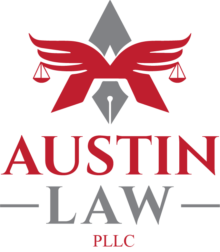At Austin Law, we know that navigating the criminal justice system can be challenging, especially when it comes to probation. If you’re on probation and face the possibility of revocation, it’s essential to understand the process and your rights. In this post, we’ll explain what probation revocation hearings are, how they work, and how an attorney can help you achieve a better outcome.
What Is a Motion to Revoke Probation?
When you’re placed on probation for a misdemeanor, you’re expected to adhere to certain conditions, such as attending substance abuse recovery meetings and checking in with your probation officer. If you fail to meet these requirements, law enforcement can file a motion to revoke your probation. This document notifies the court that you’ve allegedly violated the terms of your probation.
Once the motion is accepted, the judge may issue a warrant for your arrest, allowing law enforcement to take you into custody until a revocation hearing can be scheduled.
What Happens in a Probation Revocation Hearing?
A probation revocation hearing, often called a violation hearing, is a crucial step in determining your future. Here’s what to expect:
- No Jury Present: The hearing is conducted by a judge without a jury. Present are the defendant, their attorney, the judge, and the prosecuting attorney.
- Review of Allegations: The judge will outline the probation violations you’re accused of committing and will ask you to respond.
- Pleading Your Case:
- If you admit to the violations, you can plead “True.”
- If you disagree with the allegations, you can plead “Not True,” leading to a contested hearing where the prosecution must present evidence against you.
- Decision Time: After hearing the evidence, the judge will determine if the violations are “True” or “Not True.” If the judge finds in your favor, the motion is dismissed, and your probation continues. If not, the judge will decide the consequences.
Potential Outcomes After the Hearing
If the judge concludes that you violated probation, several outcomes are possible:
- Revocation: This is the most severe consequence, resulting in the judge sending you back to jail or prison for the remainder of your original sentence.
- Modification: The judge may allow you to remain on probation but change the conditions or impose stricter requirements.
- Extension: Your probation term may be extended, adding time to your original sentence.
- Continuation: If the judge finds in your favor, your probation may continue unchanged, which is the most favorable outcome.
Does Time Served on Probation Count if Revoked?
If your probation is revoked, the time you’ve already served may not always count toward your sentence. For example, if you were sentenced to two years in jail and spent one year on probation before a violation, you might still be required to serve the full two years rather than just one.
In cases where a new crime is committed, you could face penalties for both the original offense and any new charges, making the situation even more complex.
How a Probation Revocation Attorney Can Help
If you’re facing a probation violation or are awaiting a revocation hearing, it’s vital to consult with a qualified attorney. The consequences of having your probation revoked can be severe, affecting your freedom and future opportunities.
Here’s how an attorney can assist you:
- Challenging Evidence: The burden of proof lies with the prosecution to demonstrate that you committed the violation. Your attorney can scrutinize the evidence and challenge its validity.
- Arguing for Leniency: A skilled attorney can present your case to the judge, potentially arguing that any violation was minor and not sufficient for revocation.
- Navigating the Process: Your lawyer will guide you through the legal process, ensuring that your rights are protected and that you understand each step.
Conclusion
Understanding probation revocation hearings is crucial for anyone facing these allegations. If you find yourself in this situation, don’t hesitate to reach out to Austin Law. Our experienced team is here to help you navigate the complexities of the legal system and work towards a favorable outcome.
